|
|
|
Sort Order |
|
|
|
Items / Page
|
|
|
|
|
|
|
| Srl | Item |
| 1 |
ID:
086438
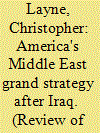

|
|
|
|
|
| Publication |
2009.
|
| Summary/Abstract |
In this paper, I argue that there is an emerging consensus among realists that the US should abandon its hegemonic strategy and adopt an offshore balancing strategy. Here, Iraq and the so called war on terrorism (or 'long war', or 'global counter-insurgency', as some American officials sometimes refer to it) have been the catalysts. Increasingly, it is recognised that US aims in the Persian Gulf/Middle East - and the American military presence in the region - have fuelled terrorism, and caused Iran to self-defensively seek to acquire a nuclear weapons capability. A number of leading realists now argue that the best strategy for the US is to extricate itself from Iraq, reduce its regional footprint, and adopt an offshore balancing strategy.
|
|
|
|
|
|
|
|
|
|
|
|
|
|
|
|
| 2 |
ID:
075576
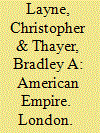

|
|
|
|
|
| Publication |
London, Routledge, 2007.
|
| Description |
ix, 152p.
|
| Standard Number |
0415952034
|
|
|
|
|
|
|
|
|
|
|
|
Copies: C:1/I:0,R:0,Q:0
Circulation
| Accession# | Call# | Current Location | Status | Policy | Location |
| 052088 | 327.1/LAY 052088 | Main | On Shelf | General | |
|
|
|
|
| 3 |
ID:
080009
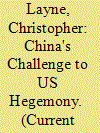

|
|
|
|
|
| Publication |
2008.
|
| Summary/Abstract |
If the United States tries to maintain its current dominance in East Asia, Sino-American conflict is virtually certain
|
|
|
|
|
|
|
|
|
|
|
|
|
|
|
|
| 4 |
ID:
175219
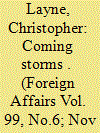

|
|
|
|
|
| Summary/Abstract |
Since the closing days of the Cold
War,U.S. policymakers, pundits,
international relations scholars, and
policy analysts have argued that greatpower war is a relic of a bygone age.
|
|
|
|
|
|
|
|
|
|
|
|
|
|
|
|
| 5 |
ID:
113131
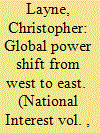

|
|
|
|
|
| Publication |
2012.
|
| Summary/Abstract |
WHEN GREAT powers begin to experience erosion in their global standing, their leaders inevitably strike a pose of denial. At the dawn of the twentieth century, as British leaders dimly discerned such an erosion in their country's global dominance, the great diplomat Lord Salisbury issued a gloomy rumination that captured at once both the inevitability of decline and the denial of it. "Whatever happens will be for the worse," he declared. "Therefore it is our interest that as little should happen as possible." Of course, one element of decline was the country's diminishing ability to influence how much or how little actually happened.
|
|
|
|
|
|
|
|
|
|
|
|
|
|
|
|
| 6 |
ID:
073850
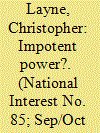

|
|
|
| 7 |
ID:
086317
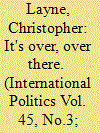

|
|
|
|
|
| Publication |
2008.
|
| Summary/Abstract |
Euro-American ties - and NATO - have been ruptured, and never again will be the same. Of course, as the historian Lawrence S. Kaplan correctly observed, 'The idea of NATO being in a terminal state has been a topic for pundits since the 1950s' (Kaplan, 1992, 16). It still is. However, today those who argue that the Alliance is in terminal decline have a very strong case to make. There are four reasons for this. First, the Cold War's end has deprived NATO of its essential raison d'être. Second, the European Union has not only taken huge strides toward attaining political and economic unity but now also has taken significant steps to creating the capacity to act independently of the United States in the security arena. Third, the structural effects of unipolarity are pushing the EU in the direction of counter-balancing American preponderance. Fourth, the Iraq war has highlighted the divergent geopolitical interests of the US and the EU.
|
|
|
|
|
|
|
|
|
|
|
|
|
|
|
|
| 8 |
ID:
070373


|
|
|
|
|
| Publication |
Santa Monica, Rand Corporation, 2000.
|
| Description |
vii, 54p.
|
| Standard Number |
0833028030
|
|
|
|
|
|
|
|
|
|
|
|
Copies: C:1/I:0,R:0,Q:0
Circulation
| Accession# | Call# | Current Location | Status | Policy | Location |
| 043844 | 355.0332/TEL 043844 | Main | On Shelf | General | |
|
|
|
|
| 9 |
ID:
070389


|
|
|
|
|
| Publication |
Santa Monica, Rand Corporation, 2000.
|
| Description |
xvi, 196p.
|
| Standard Number |
0833027921
|
|
|
|
|
|
|
|
|
|
|
|
Copies: C:1/I:0,R:0,Q:0
Circulation
| Accession# | Call# | Current Location | Status | Policy | Location |
| 043843 | 355.332/TEL 043843 | Main | On Shelf | General | |
|
|
|
|
| 10 |
ID:
076097
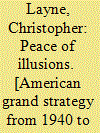

|
|
|
|
|
| Publication |
Ithaca, Cornell University Press, 2006.
|
| Description |
xi, 290p.
|
| Series |
Cornell studies in security affairs
|
| Standard Number |
9780801437137
|
|
|
|
|
|
|
|
|
|
|
|
Copies: C:1/I:0,R:0,Q:0
Circulation
| Accession# | Call# | Current Location | Status | Policy | Location |
| 052405 | 327.73009045/LAY 052405 | Main | On Shelf | General | |
|
|
|
|
| 11 |
ID:
056703
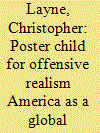

|
|
|
|
|
| Publication |
Winter 2002-03.
|
|
|
|
|
|
|
|
|
|
|
|
|
|
|
|
| 12 |
ID:
071047
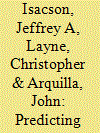

|
|
|
|
|
| Publication |
Santa Monica, Rand Corporation, 1999.
|
| Description |
xi, 60p.
|
| Standard Number |
0833026755
|
|
|
|
|
|
|
|
|
|
|
|
Copies: C:1/I:0,R:0,Q:0
Circulation
| Accession# | Call# | Current Location | Status | Policy | Location |
| 041305 | 355.02/ISA 041305 | Main | On Shelf | General | |
|
|
|
|
| 13 |
ID:
175849
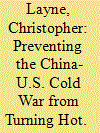

|
|
|
|
|
| Summary/Abstract |
During the Trump administration, Sino-American relations have deteriorated to the point where the new consensus in the U.S. foreign policy establishment is that a new Cold War has begun between the U.S. and China. This article looks at the origins of the “first Cold War” for insight into how a second Cold War might be avoided. There is a danger of the Cold War turning hot because of power transition dynamics. This article also invokes the pre-1914 Anglo-German rivalry, and argues that if conflict is to be avoided, the U.S. must accommodate China's rise by yielding hegemony in East Asia and meeting China's status claim.
|
|
|
|
|
|
|
|
|
|
|
|
|
|
|
|
| 14 |
ID:
084567
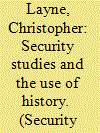

|
|
|
|
|
| Publication |
2008.
|
| Summary/Abstract |
In The Gathering Storm, Winston S. Churchill claimed that during the 1930s British leaders were willfully blind to the German threat and failed to meet it by rearming. Accepting the Churchillian narrative, leading IR scholars regard British grand strategy during the 1930s as glaring example of strategic adjustment failure. This article reappraises British grand strategy during the 1930s and rejects both the Churchillian narrative, and the scholarly claims that Britain did not adjust its strategy to the German threat. In the 1930s, Britain did balance against Germany and focused on countering what policy makers perceived as the key threat facing Britain: its vulnerability to German air attack. Britain's grand strategic options were limited by external conditions and by domestic economic constraints. Neville Chamberlain, therefore, was playing a weak hand, and did the best that he could with the cards he was dealt. Britain's 1930s grand strategy is one of the historical cases most frequently used by IR scholars for theory testing. For that reason alone, it is important to get the history right. This is not the only reason, however. The 1930s have provided many of the concepts, images, and metaphors that have dominated the discourse about American foreign policy since World War II. Because scholarship about the events of the 1930s shapes the discourse about real-world policy, getting the history right matters
|
|
|
|
|
|
|
|
|
|
|
|
|
|
|
|
| 15 |
ID:
138619
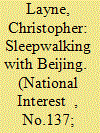

|
|
|
|
|
| Summary/Abstract |
THE CAUSE of the Great War, as it used to be known, has never settled into received wisdom. Unlike World War II, where Nazi Germany was clearly the culprit, World War I remains a more mysterious affair, with various candidates continuing to be offered up by historians as the guilty party, ranging from Wilhelmine Germany to the Habsburg monarchy or even Russia, as a recent book by Sean McMeekin would have it. But though controversy continues to swirl around the origins of the war—and probably always will—this doesn’t mean that there are no lessons to be drawn from the conflict. It doesn’t require perfect knowledge to grasp the outlines of what went wrong. The losses were so immense and the consequences so perilous that it would be reckless not to try to divine some warning signals from what occurred to the statesmen who ended up plunging the globe into a malignant cataclysm.
|
|
|
|
|
|
|
|
|
|
|
|
|
|
|
|
| 16 |
ID:
106955
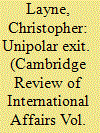

|
|
|
|
|
| Publication |
2011.
|
| Summary/Abstract |
In this article I show that the unipolar era already is drawing to a close. Three main drivers explain the impending end of the Pax Americana. First, the rise of new great powers-especially China-is transforming the international system from unipolarity to multipolarity. Second, the United States is becoming the poster child for strategic over-extension, or as Paul Kennedy dubbed it, imperial overstretch. Third, the United States' relative economic power is declining, and mounting US fiscal problems and the dollar's increasingly problematic role as the international financial system's reserve currency are undermining US hegemony. After examining how these trends undermine the argument for 'unipolar stability', I conclude by arguing that over the next two decades the Pax Americana's end presages dramatic changes in international politics.
|
|
|
|
|
|
|
|
|
|
|
|
|
|
|
|
| 17 |
ID:
074628
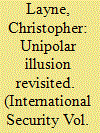

|
|
|
|
|
| Publication |
2006.
|
| Summary/Abstract |
The conventional wisdom among U.S. grand strategists is that U.S. hegemony is exceptional-that the United States need not worry about other states engaging in counterhegemonic balancing against it. The case for U.S. hegemonic exceptionalism, however, is weak. Contrary to the predictions of Waltzian balance of power theorists, no new great powers have emerged since the end of the Cold War to restore equilibrium to the balance of power by engaging in hard balancing against the United States-that is, at least, not yet. This has led primacists to conclude that there has been no balancing against the United States. Here, however, they conºate the absence of a new distribution of power in the international political system with the absence of balancing behavior by the major second-tier powers. Moreover, the primacists' focus on the failure of new great powers to emerge, and the absence of traditional "hard" (i.e., military) counterbalancing, distracts attention from other forms of counterbalancing-notably "leash-slipping"-by major second-tier states that ultimately could lead to the same result: the end of unipolarity. Because unipolarity is the foundation of U.S. hegemony, if it ends, so too will U.S. primacy.
|
|
|
|
|
|
|
|
|
|
|
|
|
|
|
|
| 18 |
ID:
159468
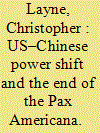

|
|
|
|
|
| Summary/Abstract |
In this article, I show that far from consenting to be bound by institutions and rules of the Pax Americana, China is already working to recast the international order in ways that favour its interests, not those of the United States. The US foreign policy establishment does not grasp this, and, instead, has invested the idea of a ‘rules-based, institutionalized’ international order with a talismanic quality. It claims that rules and institutions are politically neutral, and, ipso facto, beneficial for all. However, in international politics, who rules makes the rules. Rules and institutions reflect the distribution of power in the international system. A power transition is taking place in the early twenty-first century: US power is in relative decline and China is rising quickly. No international order—not even the Pax Americana—lasts forever. The liberal world order cannot survive the erosion of US hegemonic power. It is this structural change, not Donald Trump, that threatens the post-Second Word War international order's survival. It requires a huge leap of faith to believe that a risen China will continue to subordinate itself to the Pax Americana.
|
|
|
|
|
|
|
|
|
|
|
|
|
|
|
|
| 19 |
ID:
090996
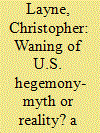

|
|
|
|
|
| Publication |
2009.
|
| Summary/Abstract |
Over the next two decades, international politics will be shaped by whether the international system remains unipolar or is transformed into a multipolar system. Can the United States sustain its primacy? Or will the emergence of new great powers reorder the distribution of power in the international system? If U.S. power is waning, will power transition dynamics result in security competitions and an increased possibility of war? In particular, what are the implications of China's rapid ascent to great power status? If the United States is unable to preserve its hegemonic role, what will happen to the security and economic frameworks that it took the lead in creating after the end of World War II and that have provided the foundation for the international order ever since? In a world no longer defined by U.S. hegemony, what would become of globalization and the open international economic system that the United established after World War II and expanded after the Cold War ended? This essay reviews five publications that grapple with these questions: Stephen G. Brooks and William C. Wohlforth, World Out of Balance: International Relations and the Challenge of American Primacy; Parag Khanna, The Second World: Empires and Influence in the New Global Order; Kishore Mahbubani, The New Asian Hemisphere: The Irresistible Shift of Global Power to the East; National Intelligence Council, Global Trends 2025: A Transformed World; and Fareed Zakaria, The Post-American World.
|
|
|
|
|
|
|
|
|
|
|
|
|
|
|
|
| 20 |
ID:
080590
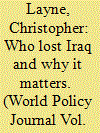

|
|
|
|
|
|
|
|